The Ventricular Fibrillation Treatment Market is estimated to be valued at USD 10.8 billion in 2025 and is projected to reach USD 24.5 billion by 2035, registering a compound annual growth rate (CAGR) of 8.5% over the forecast period.
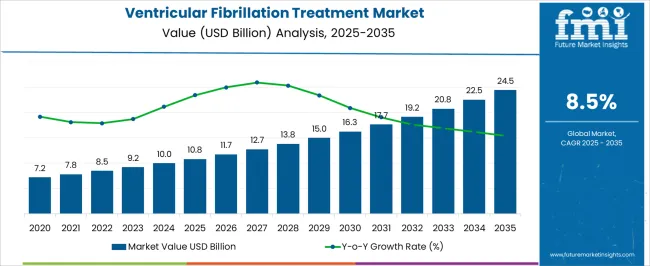
| Metric | Value |
|---|---|
| Ventricular Fibrillation Treatment Market Estimated Value in (2025 E) | USD 10.8 billion |
| Ventricular Fibrillation Treatment Market Forecast Value in (2035 F) | USD 24.5 billion |
| Forecast CAGR (2025 to 2035) | 8.5% |
The ventricular fibrillation treatment market is expanding as a result of rising prevalence of cardiovascular diseases, increasing awareness regarding early intervention, and advancements in both diagnostic and treatment technologies. A strong emphasis is being placed on reducing sudden cardiac arrest related fatalities, driving the adoption of rapid diagnostic methods and emergency interventions.
Improvements in diagnostic accuracy, integration of portable monitoring devices, and public health initiatives focused on awareness and preparedness are accelerating growth. On the treatment side, growing access to emergency response training and availability of advanced resuscitation equipment are strengthening adoption.
Regulatory bodies and healthcare systems are also investing in improved cardiac care infrastructure. The outlook remains optimistic as innovation in diagnostics and emergency care continues to advance, making timely detection and intervention more effective and accessible worldwide.
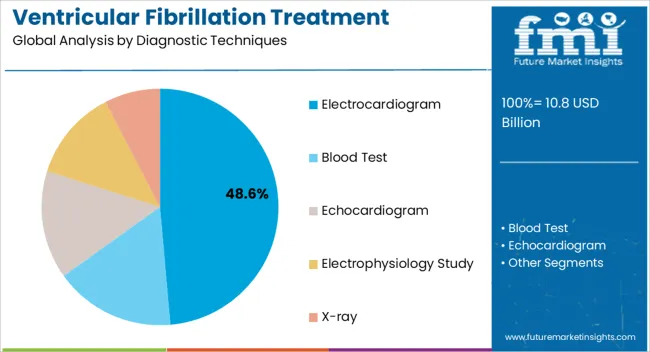
The electrocardiogram segment is projected to account for 48.60% of market revenue by 2025 within diagnostic techniques, making it the leading segment. Its dominance is attributed to its ability to provide rapid, accurate, and non invasive detection of abnormal heart rhythms.
The technology is widely available across hospitals, clinics, and emergency response systems, reinforcing its accessibility and utility. Enhanced digital integration and portable ECG devices have further increased its adoption in both clinical and pre hospital environments.
The ability of electrocardiograms to deliver immediate insights into cardiac abnormalities has strengthened their position as the first line diagnostic tool in ventricular fibrillation cases.
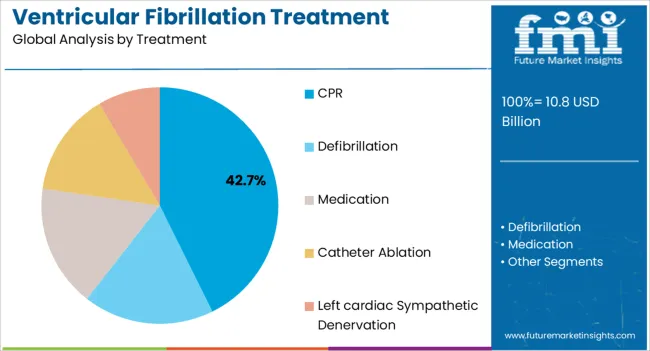
The CPR segment is expected to contribute 42.70% of total revenue by 2025 within the treatment category, establishing it as the most prominent treatment method. This is primarily due to its critical role as an immediate life saving intervention during cardiac arrest situations.
Growing public training initiatives and government supported awareness campaigns have increased the adoption of CPR as a universal emergency response technique. Its simplicity, accessibility, and proven effectiveness in sustaining blood flow until advanced treatment is available make it indispensable.
The continued emphasis on early intervention and survival outcomes in cardiac emergencies has ensured CPR’s position as the leading treatment method within the ventricular fibrillation treatment market.
The global Ventricular Fibrillation Treatment Market grew at a CAGR of 6.8% from 2020 to 2025, as per Future Market Insights, a provider of market research and competitive intelligence.
Earlier, the most common presentation for VF is sudden collapse from cardiac arrest leading to SCD. This results from improper ventricular contraction resulting in low cardiac output. Patients may demonstrate signs of acute MI such as chest pain, shortness of breath, nausea, and vomiting before the event. Patients with a known history of coronary artery disease or congestive heart failure may show a worsening of chronic symptoms such as angina, dyspnea, orthopnea, paroxysmal nocturnal dyspnea, and pedal edema. At the time of presentation, patients are unconscious, unresponsive, and have no palpable pulse. Without prompt action, this leads to death within the next few minutes. Patients with ICD for primary or secondary prevention can experience shock from ICD firing at the time of experiencing VF.
Nowadays, ICDs can reduce the risk of sudden cardiac death by the development of an entirely subcutaneous ICD (S-ICD) system with efficacy similar to that of conventional ICD in terminating VF which has been a major advance in device technology. Although randomized comparative data are not yet available, pooled data from the EFFORTLESS and IDE trials have shown the S-ICD to be a safe and effective alternative to conventional transvenous ICDs- especially in younger patients with HCM, genetic channelopathies, and adult complex congenital heart disease.
Introduction of interventional cardiology devices
The high utilization of cardiac diagnostics and monitoring devices for ventricular fibrillation treatment is boosting the sales of diagnostic devices. Some of the devices are Holter monitors, ECGs, diagnostic catheters, etc. The advent of portable and digital systems and the expanding usage of these devices in interventional medical procedures like catheter placement are thus fuelling the demand for devices required in the treatment of the ventricular fibrillation industry.
A surge in the worldwide prevalence of cardiovascular disorders
Global demand for electrophysiology devices is raising as ventricular fibrillation and other heart disorders become more common. The Centers for Disease Control and Prevention (CDC) estimate that 0.5% of the world’s population is having ventricular fibrillation where the disorder affects 2% of people under age 65, whereas it has affected about 9% of people over the age of 65 globally.
Focus on investing in R&D products
There has been a noticeable rise in the number of patients suffering from VF where the risk is noticed in patients suffering from hypertension, obesity, and other cardiovascular diseases. But this increase in the pool of patients will also significantly bring ample opportunities.
Companies are not only focusing to invest in R&D for enhancing their product, services, technology, and processes but also in creating new products where companies are also focusing on adding new features for the existence of new products for enhancing their product portfolio.
High efficiency of ablation procedures will offer several business growths
The electrophysiology market from the EP ablation catheters segment held around 48% revenue share in 2025. Among EP ablation catheters, cryoablation is majorly a growing segment that is owing to its superior therapeutic advantages. Ablation catheters deliver minimal invasive ways to efficiently treat a wide range of arrhythmias with lesser pain and blood loss.
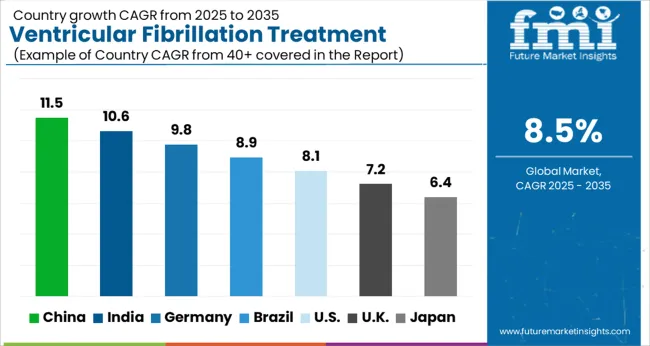
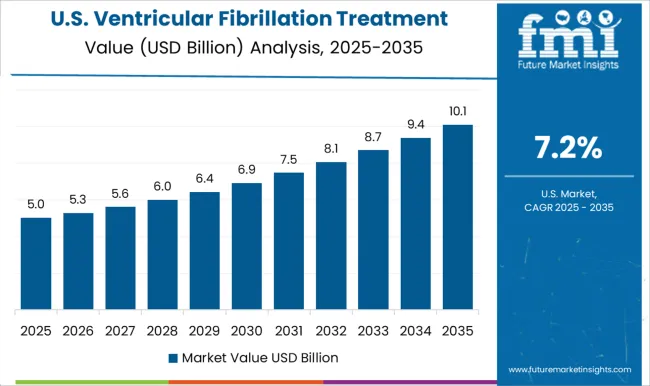
Adoption of ventricular restoration systems
North America is expected to hold the largest market share in the ventricular fibrillation market. This is attributed to the high demand and adoption of ventricular restoration systems. This well-established healthcare system along with skilled professionals will also serve as one of the major factors leading to the dominance of this region in the global ventricular fibrillation treatment market.
Rapid advancement in the medical sector
The market in Asia-Pacific is assumed to grow at a rapid rate throughout the anticipated time. The region’s expansion is driven by a high proportion of elderly people with rising heart risk. Also, it is expected that the developing healthcare infrastructure, greater patient awareness, and higher healthcare spent in the nations such as China, India, and Japan.
Catheter ablation will have a dominant share
Catheter ablation by PDN in patients with recurrent VF or polymorphic VT in the absence of regional substrate or distinct triggers was effective in terms of reducing arrhythmia recurrence and ICD shock burden.
Catheter ablation by PDN was technically feasible with acceptable procedure durations and low complication rates.
Electrocardiograms have a dominant share
This quick and painless test measures the electrical activity of the heart. Sticky patches (electrodes) are placed on the chest and sometimes the arms and legs. Wires connect the electrodes to a computer, which displays the test results. An ECG can show if the heart is beating too fast or too slowly. In a person suffering from ventricular fibrillation, the ECG usually shows a heartbeat of about 300 to 400 beats a minute.
Atricure provides a range of products including cardiac ablation devices, left atrial appendage occlusion devices, and intraoperative testing equipment. The company went public in 2005. In Oct 2020, it acquired nContact, a privately held developer of cardiac ablation solutions.
Provider and developer of an AI-based cardiac ablation therapy software and device. It offers the product CathVision Cube which can visualize electrophysiology signals to support delivering accurate therapy. CathVision Cube is a product that comprises low-noise ablation therapy with signal quality to stream, analyze and store EP signals. The interface provides a real-time streaming review window for analysis using AI algorithms for clinical decision support. The software integrated into the device helps in analyzing and storage of EP signals.
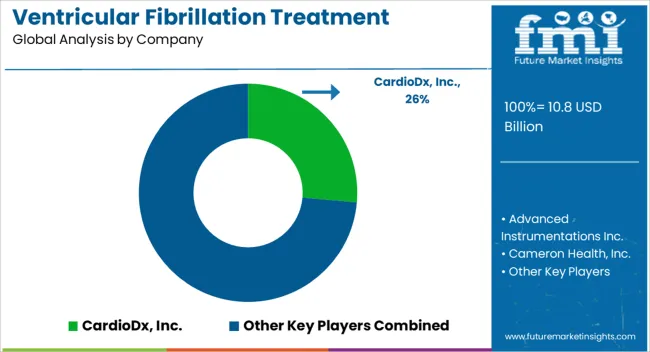
Some of the prominent players in the global market for VF treatment are:
Some of the important developments of the key players in the market are:
In March 2024, the Rankin government announced that all public schools in Nova Scotia would be provided with automated external defibrillators. The government invested USD 700,000.
In February 2025, Medtronic said that Freezor and Freezor Xtra Cardiac Cryoablation Focal Catheters, the first and only ablation catheters licensed to treat the rising prevalence of juvenile Atrioventricular Nodal Reentrant Tachycardia, had obtained FDA extended approval (AVNRT).
| Report Attribute | Details |
|---|---|
| Growth Rate | CAGR of 8.5% from 2025 to 2035 |
| Market value in 2025 | USD 10.8 billion |
| Market value in 2035 | USD 24.5 billion |
| Base Year for Estimation | 2025 |
| Historical Data | 2020 to 2025 |
| Forecast Period | 2025 to 2035 |
| Quantitative Units | USD Billion for Value and CAGR from 2025 to 2035 |
| Report Coverage | Revenue Forecast, Company Ranking, Competitive Landscape, Growth Factors, Trends, and Pricing Analysis |
| Segments Covered | Diagnostic techniques, Treatment, Region |
| Regions Covered | North America; Latin America; Europe; South Asia; East Asia; Oceania; Middle East & Africa |
| Key Countries Profiled | United States, Canada, Brazil, Mexico, Rest of Latin America, Germany, United Kingdom, France, Spain, Italy, Rest of Europe, India, Malaysia, Singapore, Thailand, Rest of South Asia, China, Japan, South Korea, Australia, New Zealand, GCC countries, South Africa, Israel, Rest of MEA |
| Key Companies Profiled | CardioDx, Inc.; Advanced Instrumentations Inc.; Cameron Health, Inc.; Bexen Cardio; CU Medical Systems, Inc.; Biotronik SE & Co. KG; Pfizer Inc.; Heritage Pharmaceuticals Inc.; Baxter International Inc.; Lawson Health Research Institute |
| Customisation Scope | Available on Request |
The global ventricular fibrillation treatment market is estimated to be valued at USD 10.8 billion in 2025.
The market size for the ventricular fibrillation treatment market is projected to reach USD 24.5 billion by 2035.
The ventricular fibrillation treatment market is expected to grow at a 8.5% CAGR between 2025 and 2035.
The key product types in ventricular fibrillation treatment market are electrocardiogram, blood test, echocardiogram, electrophysiology study and x-ray.
In terms of treatment, cpr segment to command 42.7% share in the ventricular fibrillation treatment market in 2025.
Explore Similar Insights

Thank you!
You will receive an email from our Business Development Manager. Please be sure to check your SPAM/JUNK folder too.
Chat With
MaRIA